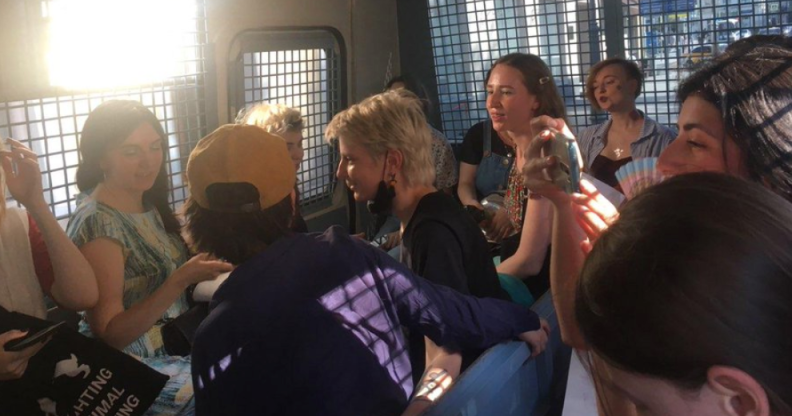Over 30 people arrested in Russia for supporting an LGBT+ activist charged with spreading ‘gay propaganda’

More than 30 people, mostly women, were arrested for protesting in Russia (Twitter/@AlexKokcharov)
Police in Russia have detained over 30 people for protesting the arrest of Yulia Tsvetkova, an LGBT+ and feminist activist charged with spreading ‘gay propaganda’.
Yulia Tsvetkova, 27, faces a six year sentence for running a social media page called Vagina Monologues, which encouraged people to share artistic depictions of vaginas to “remove the taboo”.
She was charged with the distribution of “criminal pornography” under Russia’s gay propaganda law, which prohibits the positive depiction of LGBT+ people.
On Saturday (June 27) more than 30 people, mostly women, gathered in in central Moscow to stage separate one-person protests against Tsvetkova’s charges.
Participants stood in line to picket one at a time, with one holding a placard that read: “Today they send [us] to prison for pictures, tomorrow they will send [us] to prison for letters? Freedom for Yulia Tsvetkova!”
According to the OVD-Info group that monitors political arrests in Russia, at least 38 people were detained and taken to a police station. It was not clear if they would be charged.
Russian law usually permits single pickets to be held without permission, but in recent weeks there have been numerous cases of police arresting protesters on the grounds that they violated the ban on mass gatherings imposed during the pandemic.
Police declined to comment on the arrests when questioned by The Guardian on Saturday.
Russia is currently in the midst of a referendum a package of constitutional amendments that will take Russia’s opposition to homosexuality a step further by enshrining traditional “family values” as part of the constitution.
Among the amendments proposed by Putin is one that would legally define marriage as a union between a man and a woman. Russian LGBT+ activists fear that, if passed, it would permanently block same-sex marriage or adoption from ever being legalised in the country.
The referendum has been accompanied by a wave of homophobic rhetoric and viral campaign ads denouncing the LGBT+ community.

